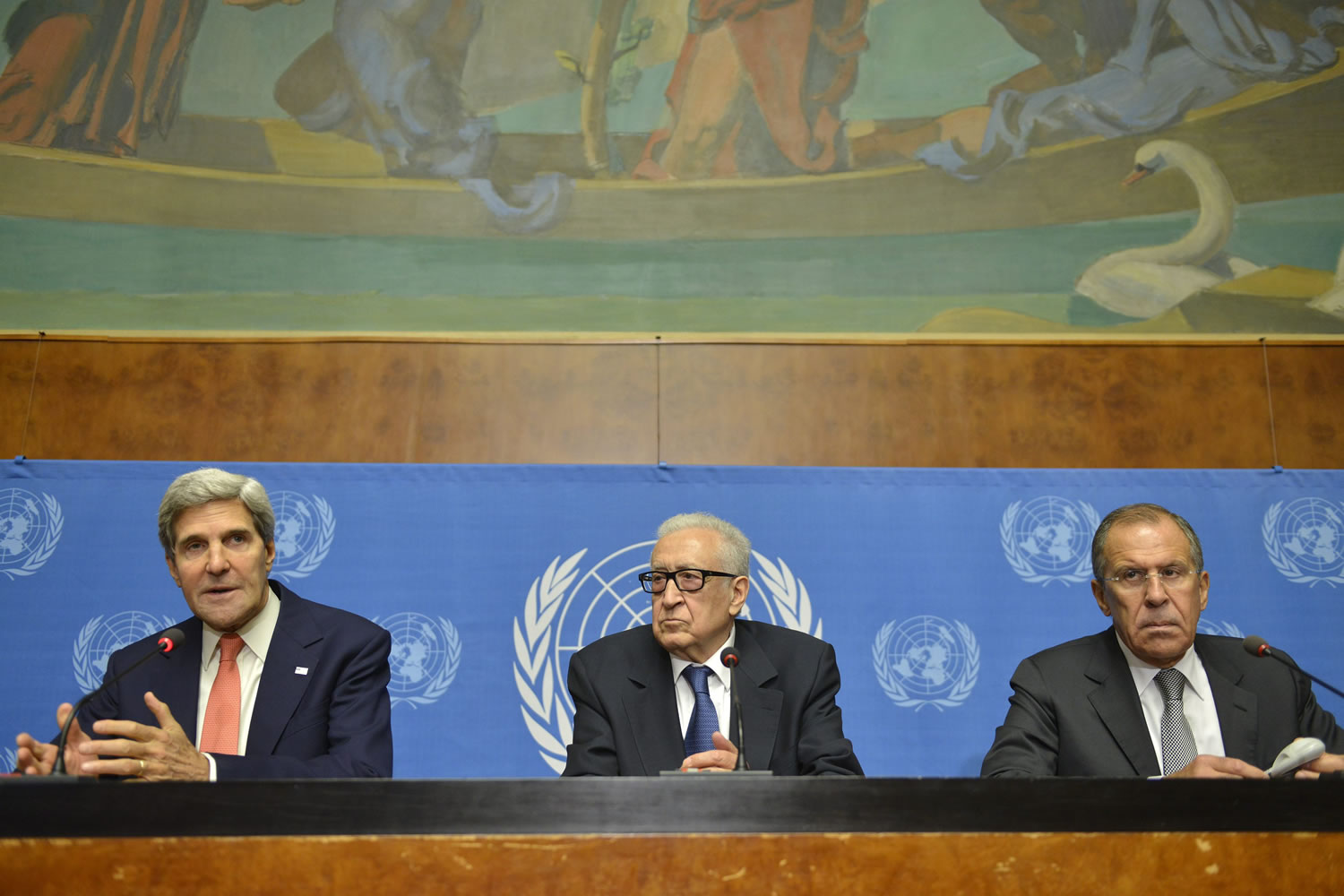GENEVA — The top diplomats from the United States and Russia raised hopes Friday for reviving broad talks to end the long and deadly Syrian civil war, even as they struggled to deal with the most notorious part — the use of chemical weapons on civilians. The path to a U.N. resolution on securing those weapons seemed at least somewhat clearer, with the U.S. indicating it could accept an enforcement measure that didn’t threaten military retribution.
U.S. Secretary of State John Kerry and Russian Foreign Minister Sergey Lavrov, leading talks in Geneva to defuse the crisis, both made clear that any prospects for restarting broad peace negotiations depended on first settling the standoff over the chemical weapons. They were to meet again Saturday.
The U.S. has been seeking a U.N. Security Council resolution to solidify the turnover that Syrian President Bashar Assad has promised, including consequences if he doesn’t follow through. Addressing a difficult sticking point, administration officials said Friday that President Barack Obama was open to a resolution that did not include military force as a punishment, given that Russia would be all but certain to veto any measure including such a penalty.
Even without a military trigger included in a U.N. resolution, the officials said Obama would retain the authority to order U.S. airstrikes against Syria.
At the White House, Obama said any agreement to remove Syria’s chemical weapons stockpile “needs to be verifiable and enforceable.” As for possible U.N. action, State Department spokeswoman Jen Psaki said, “We are not going to prejudge the outcome of negotiations that are just beginning in New York. The U.S. has been clear that for any effort to be credible it must be verifiable and include consequences for noncompliance.”
Senior administration officials also outlined for the first time a timetable for a diplomatic resolution of the issue of the weapons, saying the U.S. will know within a few weeks whether a path is workable. The officials spoke only on condition of anonymity because they were not authorized to discuss the internal deliberations publicly.
U.N. inspectors prepared to turn in their own poison gas report this weekend, sure to be an important basis for any further action. Secretary-General Ban Ki-moon said Friday that he expected “an overwhelming report” that chemical weapons were indeed used on the outskirts of Damascus on Aug. 21.
Two U.N. diplomats, speaking on condition of anonymity because the time was not yet final, said Friday night Ban was expected to brief the Security Council on the report Monday morning.
In Geneva, meanwhile, Kerry and Lavrov have disclosed little since their meetings began Thursday with Kerry’s dismissal of Assad’s offer to begin by turning over information, not weapons, starting weeks from now after signing an international convention.
A U.S. official said the talks were at a “pivotal point” and would continue Saturday morning. Some progress has been made on how to account for Syria’s chemical weapons inventory, the official said, adding that the U.S. and Russia also had narrowed their differences over what each country believes to be the size of the Syrian stockpiles.
Kerry and Lavrov also met with U.N.-Arab League envoy Lakhdar Brahimi about the potential for a new peace conference in the Swiss city. Kerry said he, Lavrov and Brahimi agreed to meet around Sept. 28 on the sidelines of the annual U.N. General Assembly meetings in New York.
“We are committed to try to work together, beginning with this initiative on the chemical weapons, in hopes that those efforts could pay off and bring peace and stability to a war-torn part of the world,” he said.
Kerry, flanked by Lavrov and Brahimi, told reporters after an hour-long meeting that the chances for a second peace conference in Geneva will require success first with the chemical weapons talks, which he said had been “constructive” so far.
“I will say on behalf of the United States that President Obama is deeply committed to a negotiated solution with respect to Syria, and we know that Russia is likewise. We are working hard to find the common ground to be able to make that happen,” Kerry said.
Brahimi acknowledged the high stakes Friday. He told Kerry and Lavrov that their chemical weapons negotiation “is extremely important in itself and for itself, but it is also extremely important for us who are working with you on trying to bring together the Geneva conference successfully.”
Kerry was traveling to Jerusalem Sunday to discuss the situation in Syria with Israeli Prime Minister Benjamin Netanyahu. He then planned to travel to Paris on Monday to meet with French Foreign Minister Laurent Fabius and British Foreign Secretary William Hague about the Syrian war. He will meet separately with Saudi Foreign Minister Saud al-Faisal.



